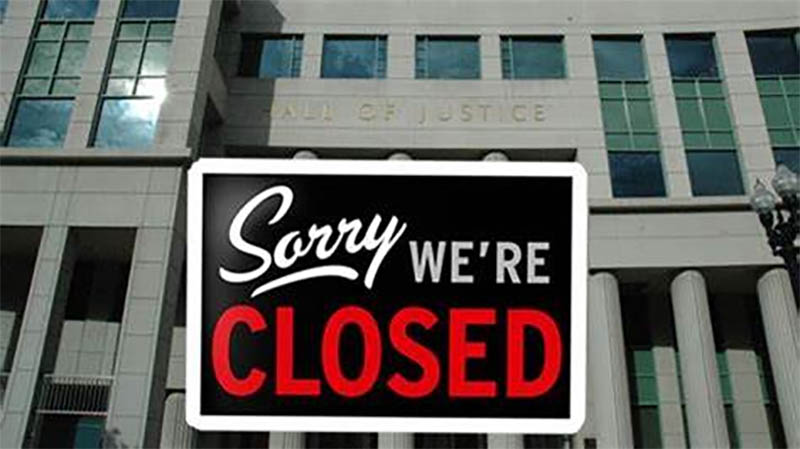Constitutional Protections Still Apply When the Courts are Closed
On March 13, 2020, the Chief Judge of the United States District Court for the District of Kansas issued Administrative Order No. 2020-3 in an effort to halt traffic in the courthouse and, thereby, combat the spread of COVID-19. The order postpones all criminal trials in Kansas federal courts. On March 16, 2020, the Chief Justice of the Kansas Supreme Court issued Administrative Order 2020-PR-016 in response to the COVID-19 pandemic. It postpones all criminal jury trials in Kansas state courts.
This has left many criminal defendants wondering: What about my speedy trial?
People accused of crimes in Kansas have two different speedy trial protections—those protections afforded by Kansas and federal statutes (“statutory speedy trial”) and those protections afforded by the Kansas and United States Constitutions (“constitutional speedy trial”).
Speedy trial statutes work by assigning a specific number of days in which a person charged with a crime must be brought to trial. If the timeline is not met, the charges must be dismissed. However, with the number of exceptions they include, speedy trial statutes can read like complicated board game instructions. The exceptions have the effect of excluding certain periods of time from the speedy trial calculation—making it so that not every day before trial counts.
The administrative orders entered earlier this month in Kansas federal and state courts specifically state that the delay caused by the orders will not count toward any criminal defendant’s speedy trial calculation.
The federal order relies on 18 U.S.C.A. 3161(h)(7)(A), the subsection of the federal speedy trial statute that allows a judge to exclude time upon finding that “the ends of justice served by taking such action outweigh the best interest of the public and the defendant in a speedy trial.”
The state order relies on new legislation created specifically for this situation. On March 19, 2020, Governor Laura Kelly signed into law Senate Bill Number 102, which amended Kansas’s speedy trial statute to permit the Chief Justice of the Kansas Supreme Court to “issue an order to extend or suspend any deadlines or time limitations established by statute when the chief justice determines such action is necessary to secure the health and safety of court users, staff and judicial officers.” The new legislation also provides that any such order may remain in effect for an additional 150 days after the “state of disaster emergency” has been terminated. Any matter affected by that suspension would then have to be brought before the court within 150 days after the Chief Justice’s order terminates. In addition, “any trial scheduled to occur during the time such order was in effect shall be placed back on the court schedule within 150 days.”
The practical effect of these administrative orders is that many defendants have had their cases continued by the court to an undetermined future date.
There are valid reasons for both administrative orders. It would be impossible to engage in trials as they are conducted today and follow the CDC’s social distancing guidelines. Trials must be conducted in person, in one courtroom. Trials also require several people to be present: the defendant, his or her attorney, the prosecutor, a court reporter, a judge, a bailiff, a dozen jurors, alternate jurors, and any number of witnesses. In addition, the vast majority of trials begin with a process called voir dire, during which dozens of prospective jurors are questioned and selected for service. Until the situation caused by the pandemic becomes more stabilized, each trial would present a significant risk of spreading the disease. Both federal and state courts have determined that the risk justifies curtailing an individual’s statutory speedy trial protections.
In sum, it will be difficult to lodge challenges to these delays on the basis of statutory speedy trial. However, that does not prevent all arguments that the COVID-19 shutdown has violated the rights of the accused. Remember we mentioned that defendants have constitutional speedy trial rights in addition to statutory speedy trial rights? A criminal defendant’s constitutional speedy trial rights cannot be changed by administrative orders or new legislation. They may be key to ensuring defendants are not prejudiced by court delays.
To analyze whether a defendant’s constitutional right to speedy trial has been violated, courts consider a set of four criteria, known as the Barker factors. Those factors are:
- The length of the delay,
- The reason for the delay,
- The defendant’s assertion of their right to a speedy trial, and
- Prejudice to the defendant.
Barker v. Wingo, 407 U.S. 514, 533-34 (1972).
Courts typically focus the most on whether or not the defendant was seriously prejudiced by the delay. While constitutional speedy trial victories are not common, this is the time to pursue them—or, at least, lay the foundation for later challenges.
In the past few weeks, we have heard the expression “unprecedented times” more times than we can count. But this is truly a new situation in the justice system. Undoubtedly, certain individuals will have their cases adversely affected by the delay, but the orders do not stop an argument that their constitutional speedy trial rights were violated.
For now, the best course of action for defense attorneys is to do everything possible to position your cases to make compelling Barker arguments when the courts reopen. And, of course, wash your hands.







